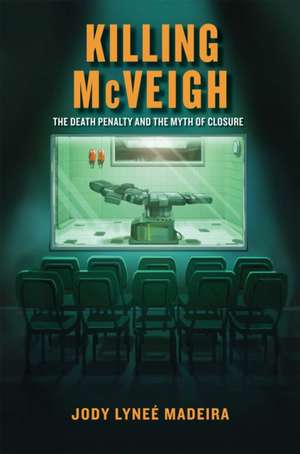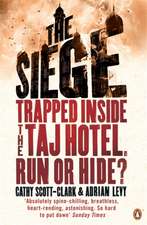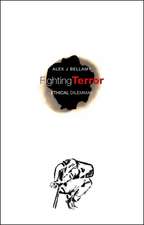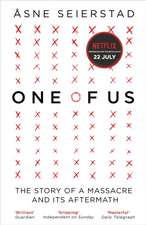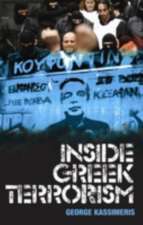Killing McVeigh – The Death Penalty and the Myth of Closure
Autor Jody Lyneé Madeiraen Limba Engleză Hardback – 10 iun 2012
| Toate formatele și edițiile | Preț | Express |
|---|---|---|
| Paperback (1) | 242.60 lei 6-8 săpt. | |
| MI – New York University – 31 oct 2013 | 242.60 lei 6-8 săpt. | |
| Hardback (1) | 529.69 lei 6-8 săpt. | |
| MI – New York University – 10 iun 2012 | 529.69 lei 6-8 săpt. |
Preț: 529.69 lei
Preț vechi: 687.92 lei
-23% Nou
Puncte Express: 795
Preț estimativ în valută:
101.37€ • 104.72$ • 84.36£
101.37€ • 104.72$ • 84.36£
Carte tipărită la comandă
Livrare economică 26 martie-09 aprilie
Preluare comenzi: 021 569.72.76
Specificații
ISBN-13: 9780814796108
ISBN-10: 0814796109
Pagini: 336
Dimensiuni: 168 x 233 x 30 mm
Greutate: 0.61 kg
Ediția:New.
Editura: MI – New York University
ISBN-10: 0814796109
Pagini: 336
Dimensiuni: 168 x 233 x 30 mm
Greutate: 0.61 kg
Ediția:New.
Editura: MI – New York University
Recenzii
"Sixteen years after the horror of the Oklahoma City bombing, it may now be possible to examine that dark day with some objectivity. In Killing McVeigh, Professor Madeira offers a faithful account of what followed through the words of victims and survivors. Her analysis shows how the death penalty forced so much energy and focus to be put on McVeigh, and how difficult it is to make sense of such a tragedy." Richard C. Dieter, Executive Director, Death Penalty Information Center
"Everyone seems to have an opinion about whether the execution of murderers can offer 'closure' to the victims loved ones. Finally, we have a study that has investigated the largest, most media-saturated mass murder and execution in recent times - the Oklahoma City bombing and the execution of Timothy McVeigh. Madeiras in-depth, fair-minded, and sensitive account opens a window for us into the struggles of those affected and explores the complicated role that our public institutions of criminal justice play in the complex and difficult work of reconstructing life after atrocity." Carol Steiker, Henry J. Friendly Professor of Law, Harvard Law School
"Clearly written and persuasive, this is an important contribution to the literature of closure." Library Journal, May 15th 2012
"Out of this curious history comes Killing McVeigh: The Death Penalty and the Myth of Closure, a timely new book by Indiana University School of Law associate professor Jody Lynee Madeira. In it, Madeira asks a question most of us have asked at one time or another in our lives: "What is closure? Does it exist? If so, where and for whom. If not, why?" She then tries to answer those questions, often laboriously, using the bombing trial survivors as her control group.... We learn how offended victims were by McVeigh's presence in court -- and also how their perceptions of his bombing conspirator, Terry Nichols, were affected by the latter's family history. We learn about the emotions the victims felt between the date of McVeigh's death sentence and his execution -- a period of only four years because McVeigh, ironically, chose not to prolong his appeals. And we learn how the subsequent 10 years, and especially the events of September 11, 2001, have affected these poor people." Andrew Cohen, The Atlantic, June 11th 2012
"Everyone seems to have an opinion about whether the execution of murderers can offer 'closure' to the victims loved ones. Finally, we have a study that has investigated the largest, most media-saturated mass murder and execution in recent times - the Oklahoma City bombing and the execution of Timothy McVeigh. Madeiras in-depth, fair-minded, and sensitive account opens a window for us into the struggles of those affected and explores the complicated role that our public institutions of criminal justice play in the complex and difficult work of reconstructing life after atrocity." Carol Steiker, Henry J. Friendly Professor of Law, Harvard Law School
"Clearly written and persuasive, this is an important contribution to the literature of closure." Library Journal, May 15th 2012
"Out of this curious history comes Killing McVeigh: The Death Penalty and the Myth of Closure, a timely new book by Indiana University School of Law associate professor Jody Lynee Madeira. In it, Madeira asks a question most of us have asked at one time or another in our lives: "What is closure? Does it exist? If so, where and for whom. If not, why?" She then tries to answer those questions, often laboriously, using the bombing trial survivors as her control group.... We learn how offended victims were by McVeigh's presence in court -- and also how their perceptions of his bombing conspirator, Terry Nichols, were affected by the latter's family history. We learn about the emotions the victims felt between the date of McVeigh's death sentence and his execution -- a period of only four years because McVeigh, ironically, chose not to prolong his appeals. And we learn how the subsequent 10 years, and especially the events of September 11, 2001, have affected these poor people." Andrew Cohen, The Atlantic, June 11th 2012
Notă biografică
Jody Lynee Madeira is Associate Professor at Indiana University Maurer School of Law.
Descriere
Demonstrates the importance of understanding what closure really is before naively asserting it can or has been reached.
